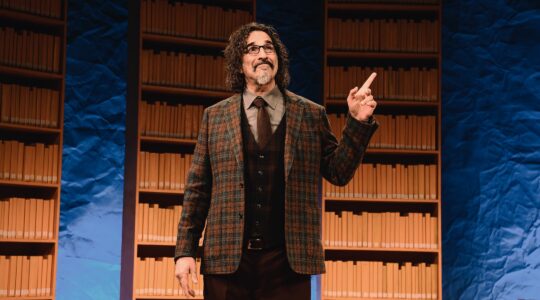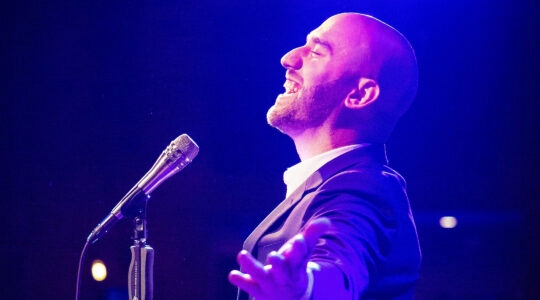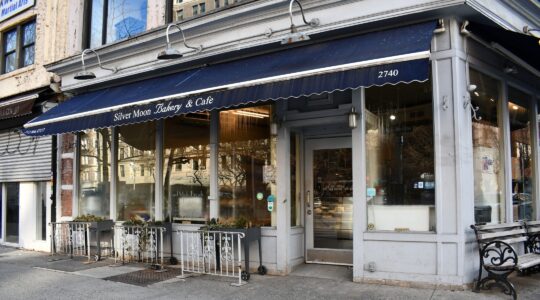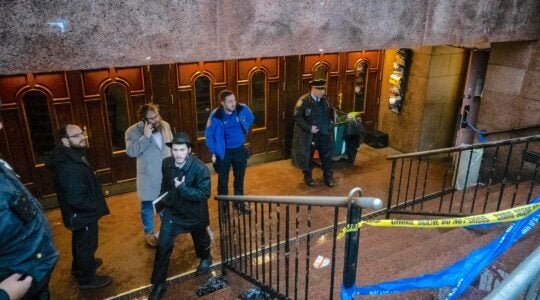Leslie Gottlieb, a lay leader at New York’s Stephen Wise Free Synagogue, noted the obvious Monday night while speaking to a reporter:
Last month’s defeat of federal gun legislation depressed many Americans, she said, including members of the Jewish community.
But Gottlieb, a member of the congregation’s Social Action Committee, said she and others at the synagogue Monday felt rejuvenated after hearing from Mark Barden, the father of a Newtown, Conn., child murdered last December, and Rep. Jerrold Nadler (D-Manhattan).
The two spoke to several hundred people at a forum organized by the committee, which chose to focus on the growing epidemic of gun violence even before the Dec. 14 massacre. The message that came across to her and other members of the audience was a simple one, Gottlieb said: There are still things that gun-control advocates can do.
(View video here; continue reading below.)
Nadler, a leading voice in Congress on gun control, expressed outrage over the Senate’s action last month, saying that the National Rifle Association and other gun-related groups lied and used fear for leverage in the debate. The Senate acted to back the firearms industry rather than to protect American citizens, he added.
“We’re now at a moment of regrouping and reassessing,” Nadler continued, referring to advocates of federal gun legislation.
But Nadler also offered hope to an audience that clearly shared his views.
The “broad center” of the American public “will now engage” with the issue, just as they did in the 1990s, when Congress passed the Brady Handgun Violence Prevention Act and approved a ban on assault weapons, he said. He urged his listeners to look at recent polling numbers for U.S. Sen. Pat Toomey (R-Pa.), whose push to expand background checks has earned him the highest approval rating since he took office in 2011, and U.S. Sen. Kelly Ayotte (R-N.H.), whose popularity has dipped 15 points since her vote against background checks.
Among the measures that need to be “vigorously pushed,” Nadler said, are a ban on assault weapons, the adoption of universal background checks and a bill to stop the online purchase of ammunition. “Our job now,” he added, is to continue to educate friends, neighbors and colleagues about common-sense measures that would reduce gun violence.
Following Nadler to the podium, Barden spoke softly and movingly about his 7-year-old son Daniel, one of the 20 children who died at the Sandy Hook Elementary School. As he did so, he often seemed on the verge of tears.
Daniel was a “light” to all those who knew him, said Barden, who has two other children, an older son and an older daughter. He was the sort of child who would see another youngster sitting alone and go over to talk to that kid, the father said, adding that Daniel “was always comforting others.”
Daniel’s compassion recently led one of Barden’s nieces to ask herself, “What would Daniel do?” on seeing one of her classmates look isolated and forlorn, Barden said. The answer was obvious, he added, and the niece approached her classmate to soothe him, an action the classmate later reported was of tremendous help. The story prompted the niece’s mother to create a Facebook page with the same question: “What Would Daniel Do?”
A musician, Barden said he was never an overtly political person, but that that’s changing in the wake of Sandy Hook. He and other Newtown families came together the day after the massacre to form the Sandy Hook Promise, a group devoted to addressing the issue of gun violence, he said. Members of the group went to Washington last month to lobby for gun legislation and later, after the measure’s defeat, Barden introduced President Barack Obama at a White House press conference.
None of the group’s members “signed up for this,” Barden said, adding that concern over the issue “isn’t about being a Democrat or being a Republican — it’s about being human.”
(Article continues after discussion below.)
if (!window[“_tok_1367419741186”]) window[“_tok_1367419741186”] = {};
window[“_tok_1367419741186”].serverUrl = “http://www.toksnn.com/partners/9409/toks”;
window[“_tok_1367419741186”].embedId = “e2e4ddb559e3a1d6e878717e9a4d0364”;
if(typeof TP === “undefined” ) {var all_script_tags = document.getElementsByTagName(‘script’);var load_script = true;for(var i=all_script_tags.length – 1; i >= 0; i–){if(all_script_tags[i].src.indexOf(“tokpartner.js”) > -1) {load_script = false;break;}}if(load_script) {(function() {var tp = document.createElement(‘script’); tp.type = ‘text/javascript’; tp.async = true;tp.src = top.location.protocol + ‘//www.toksnn.com/js/tokpartner.js’;var s = document.getElementsByTagName(‘script’)[0]; s.parentNode.insertBefore(tp, s);})();}}else{TP.loadTokBox(“tok-congress”,”_tok_1367419741186″);}
Both Nadler and Barden assured their listeners during a question-and-answer period that they could influence the outcome of the debate, even as residents of a city in which their elected representatives hold the same views they do. They can donate to groups involved in the issue, such as the Sandy Hook Promise, New Yorkers Against Gun Violence and One Million Moms for Gun Control, Nadler said. They could also donate to like-minded politicians or volunteer for their campaigns.
At Stephen Wise, the Social Action Committee works with these and others, Gottlieb said. She added that the committee would also welcome the opportunity to work on the issue with other houses of worship, including synagogues, churches and mosques.
Barden told The Jewish Week that Monday’s appearance marked the first time he has spoken at any house of worship and that he felt honored to do so. His appearance was arranged by Sandy Hook Promise after the Social Action Committee contacted the group, requesting one of the Newtown parents.
“I wanted to inspire our members to act,” said Eileen Remor, the go-between, “and I thought that hearing from a family member would achieve that.”
The sentiments expressed at the synagogue seemed to reflect those of the broader Jewish community. On the day after the Newtown massacre, for instance, member organizations of the Jewish Council for Public Affairs — the public-affairs arm of the American-Jewish community — reached a consensus over gun control in a matter of hours, not days, The Jewish Week reported in December. Ethan Felson, the organization’s vice president and director of domestic concerns, said that’s the first time he’s witnessed such consensus in his more than two decades at JCPA.
But other members of the community, including the Wisconsin-based Jews for the Preservation of Firearms Ownership, hold different views. Charles Heller, the group’s director, told The Jewish Week in December that his organization was flooded with calls since the Newtown shooting from people who were worried about gun legislation. He said at the time that a ban on assault weapons would have no effect on violence, citing studies that back that view.
Rabbi Ammiel Hirsch, the senior rabbi at Stephen Wise, said in an interview that gun advocates who speak of freedom or liberty are raising a bogus issue.
“It’s a question of the preservation of human life and the dignity of every human being,” the rabbi said. “There’s no higher value in Judaism” than those two beliefs.
The New York Jewish Week brings you the stories behind the headlines, keeping you connected to Jewish life in New York. Help sustain the reporting you trust by donating today.




